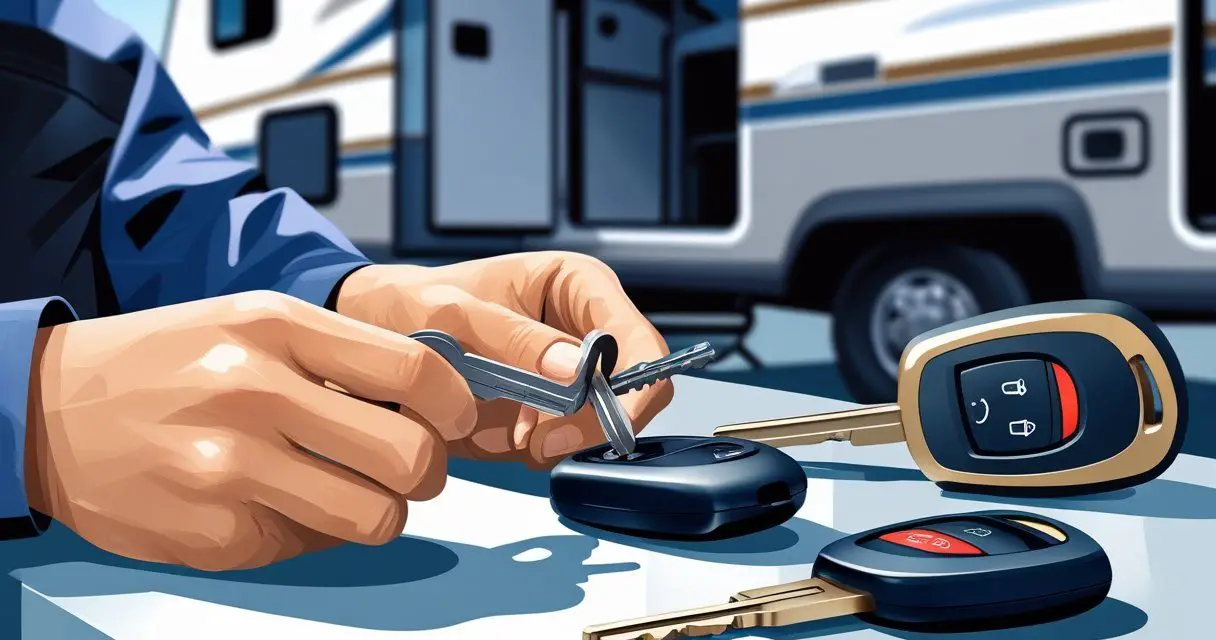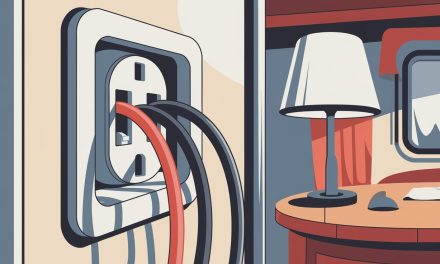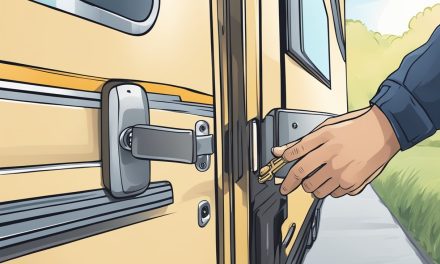Would you like to save this article?
Losing your RV keys can feel like a major setback, especially when you’re far from home or ready to hit the road. The good news is that you’re not stuck.
Yes, RV keys can be replaced, and you have several reliable options depending on your lock type and situation. Whether you misplaced a standard compartment key or lost a high-tech fob, solutions exist to get you back inside quickly.
You can order pre-cut keys online using the code stamped on your lock. You can also contact a locksmith for on-site help, or reach out to your RV manufacturer or dealer for a replacement.
Each method varies in cost and speed, but all can restore access without replacing the entire lock system. Replacing your keys also gives you a chance to improve your RV’s security.
Many owners choose to rekey their locks or upgrade to keyless entry systems that reduce the chance of future lockouts.
Key Takeaways
- RV keys can be replaced through online orders, locksmiths, or dealerships.
- Knowing your key type helps you choose the best replacement option.
- Rekeying or upgrading locks can prevent future key problems.
Understanding RV Keys and Lock Types
RV keys and locks vary by brand and purpose, but most share a few common systems. Knowing which type you have helps you find the right replacement and maintain better control over your RV’s security.
Common Types of RV Keys
You’ll find several key types in RVs, each serving a different function. Entry door keys control access to the main living area, while compartment keys open storage or utility doors.
Many RVs use the CH751 key for compartments, which is widely shared among different models. This shared design makes replacements easy to find but also reduces security.
If your compartments still use CH751 locks, consider rekeying or replacing them. Some locks are keyed alike, meaning one key opens multiple doors.
Others use master keys, which dealers or service staff may have for convenience. Knowing which system your RV uses helps you decide whether to replace, rekey, or upgrade.
| Key Type | Common Use | Security Level |
|---|---|---|
| CH751 | Compartments, utility doors | Low |
| Global Link | Entry doors | Medium |
| Bauer / TriMark | Entry and baggage doors | Medium–High |
RV Lock Mechanisms
RV locks work much like home locks but are built for lighter materials. Most use pin tumbler cylinders, which rely on small pins aligning with the key’s cuts.
When the pins line up, the plug turns to unlock the latch. Cam locks are common on exterior storage doors.
They’re simple and inexpensive but not very secure. You can upgrade to slam latch or deadbolt-style locks for stronger protection.
Some modern RVs use electronic or keypad locks for convenience. These allow you to set access codes instead of carrying keys.
If you prefer traditional locks, you can still rekey them to match one key for all doors, reducing the number of keys you need to carry.
Key Codes and Identification
Each RV key often has a code stamped on the blade or lock face. Codes like CH751, G300, or HF315 identify the key pattern used.
You can use this code to order a pre-cut replacement key without needing the original. If your key is missing, check the lock cylinder or owner’s manual for a matching code.
Many RV lock brands, such as Global Link or Bauer, use standardized codes that locksmiths or online retailers can reference. Keep a record of these codes in a safe place.
Having them handy saves time if you lose a key and ensures you get the correct replacement for your RV locks and compartments.
How to Replace Lost or Damaged RV Keys
Replacing lost or damaged RV keys involves acting quickly, identifying the correct key type, and recording useful details for future replacements.
Immediate Steps After Losing RV Keys
Start by checking for spare keys. Many RV owners store extras in secure but accessible places, such as a lockbox, hidden compartment, or with a trusted friend.
If no spare is available, contact roadside assistance or a mobile locksmith. Services like AAA or Good Sam can unlock your RV or help cut a temporary key.
Avoid forcing locks open, as this can damage the door or compartment. Instead, note your RV’s make, model, and lock brand before calling for help.
These details help locksmiths identify compatible blanks or tools. If you’re parked safely, you can also remove the affected lock and bring it to a locksmith or hardware store.
This can lower service costs and speed up replacement.
Assessing the Type of Key Needed
Different RVs use different key systems. Identifying your key type determines how and where you can replace it.
Common camper and compartment keys use stamped codes like CH751 or G391. These standard keys can be ordered pre-cut online using the code.
For ignition keys, check if your RV uses a transponder chip or smart fob. These require programming tools only found at dealerships or specialized locksmiths.
Use the table below for quick reference:
| Key Type | Common Features | Replacement Source |
|---|---|---|
| Standard mechanical | Code stamped on key or lock | Online retailer or locksmith |
| Compartment key | Shared code (e.g., CH751) | RV parts store or online |
| Transponder or fob | Electronic chip | Dealer or auto locksmith |
Knowing your key type helps you choose the fastest and most cost-effective option.
Documenting Key and Lock Information
Keeping accurate records makes future replacements easier. Write down or photograph your key codes, lock brands, and RV identification number (VIN).
Store this information in a secure location, such as a password-protected note or printed copy in your glove box. If your RV manual lists key details, keep it accessible.
You can also label compartment keys with small tags to avoid confusion between storage doors and entry locks. Maintaining clear documentation helps you order replacements quickly and verify authenticity.
Replacement Options: Where and How to Get New RV Keys
Replacing lost RV keys usually involves identifying your key type and choosing the right service for your situation. You can often get new keys by contacting the manufacturer, visiting an RV dealership, or hiring a qualified locksmith with the right tools and experience.
Contacting the RV Manufacturer
If you know your RV’s Vehicle Identification Number (VIN) or key code, contacting the manufacturer can be one of the most reliable ways to get an exact replacement. Manufacturers often keep key records linked to your VIN, which helps them identify the correct key blank or lock type.
You can usually reach the manufacturer’s customer service by phone or through their website. Provide your VIN, proof of ownership, and any key code printed on the lock or owner’s manual.
Some manufacturers can ship a pre-cut key directly to you, while others may direct you to an authorized dealer. This method ensures the key fits your locks precisely, especially for ignition or compartment locks that use unique codes.
It may take several days to receive your replacement, but it’s often the most accurate and secure option when you have the necessary information.
Visiting an RV Dealership
An RV dealership can help you replace lost keys, especially if your RV uses a transponder or smart key system. Dealerships have access to OEM key blanks and can program keys for specific models.
You’ll need to bring proof of ownership and identification. The dealership can look up your key details using your VIN and order the correct parts if they’re not in stock.
Costs vary depending on the key type. A basic mechanical key might cost around $50, while a transponder or smart fob could range from $150–$300 due to programming requirements.
Dealerships are also a good choice if you want to rekey your RV’s locks so one key works for all doors and compartments. This can simplify access and improve security.
Using Qualified Locksmith Services
A qualified locksmith can replace your RV keys even if you don’t have the key code. Many locksmiths offer mobile service and can come directly to your location.
They use decoding tools to read the lock and cut a new key on-site. This is helpful if you’re locked out or stranded away from a dealership.
Typical costs range from $90–$150 for standard keys, though prices may rise for emergency or after-hours calls. Locksmiths with the right equipment can also program transponder or electronic keys.
If your RV uses standard keyways like CH751 or G391, locksmiths can often create replacements quickly. For rare or custom locks, they may need to order blanks, but they can still ensure a correct fit and smooth operation.
Online and Retail Solutions for RV Key Replacement
You can replace most RV keys through online retailers or local stores that cut and match key blanks. Both options depend on knowing your key code or lock brand so you can order or duplicate the correct type quickly.
Ordering Keys from Online Key Replacement Services
Online key replacement services let you order pre-cut RV keys using the code stamped on your lock or original key. Sites like EasyKeys.com, RVLocksAndMore.com, and QuickShipKeys.com carry blanks for brands such as Global Link, Bauer, and Fastec.
You enter your key code (for example, CH751 or G391) during checkout. The company cuts the key to match and ships it ready to use.
Most replacements cost about $7–$15 per key, with optional expedited delivery. This method works best if you still have the lock code or can find it on the cylinder.
If your locks are older or the code is missing, you may need to contact the manufacturer or replace the lock set entirely.
| Service | Typical Price | Shipping Time | Key Type Support |
|---|---|---|---|
| EasyKeys.com | $7–$12 | 1–3 days | Door, baggage, compartment |
| RVLocksAndMore.com | $8–$15 | 2–4 days | Global Link, FIC, Bauer |
| QuickShipKeys.com | $7–$10 | 1–3 days | Trimark, Thule, Southco |
Hardware, Home Improvement, and Big Box Stores
Many hardware and home improvement stores can duplicate simple RV keys if you bring an existing copy or blank. Chains like Ace Hardware, True Value, and some Walmart locations cut standard metal keys on-site.
Not all stores stock specialty RV key blanks, so call ahead to confirm. If they don’t have your specific blank, you can bring one purchased online for them to cut.
Some stores may not handle coded or chip-based keys used in high-end motorhomes. In those cases, you’ll need a locksmith or dealer with programming tools.
Keep a record of your key code and store a spare in a safe place to avoid future delays.
Advanced Key Types: Key Fobs and Electronic Solutions
Modern RVs often use key fobs and electronic locks that combine convenience with added security. These systems can include push-start ignition, remote locking, and keypad entry, but they also require more care when replacing or reprogramming components.
Replacing RV Key Fobs
If your RV key fob is lost or damaged, you can often replace it through a dealer, locksmith, or online supplier. Dealers usually stock OEM fobs that match your RV’s make and model.
Locksmiths may offer compatible aftermarket options.
Replacement costs vary by type:
| Type | Typical Cost Range | Notes |
|---|---|---|
| Standard remote fob | $50–$150 | Basic lock/unlock functions |
| Smart key or push-start fob | $150–$300+ | May include transponder programming |
You’ll usually need your vehicle identification number (VIN) or key code to order a new fob. Some suppliers can ship pre-programmed fobs, but most require activation on-site.
Keep a spare fob stored safely. A backup helps you avoid lockouts and saves time if you lose your main remote while traveling.
Programming and Compatibility Considerations
Programming a new RV key fob depends on the lock system and manufacturer. Some fobs use simple pairing steps.
Others need specialized diagnostic tools that only dealers or qualified locksmiths have.
If your RV uses a push-start ignition or a smart key system, programming links the fob’s chip to your vehicle’s onboard computer. This prevents unauthorized access but limits do-it-yourself replacement options.
Before buying a replacement, confirm compatibility with your RV’s lock module or entry system. Using the wrong frequency or chip type can cause the fob to malfunction or fail to pair.
For older models, you may be able to reprogram the system yourself using the owner’s manual instructions. For newer or encrypted systems, professional service ensures proper synchronization and reliable operation.
Preventing Future RV Key Issues
Losing RV keys can delay travel and cause unnecessary stress. You can reduce the risk by keeping spare keys in secure locations, using tracking technology, and maintaining organized key habits.
Keeping Spare Keys Secure
Having extra RV keys is a simple way to avoid lockouts. Make at least two spares—one for your vehicle and one for a trusted person.
Avoid hiding keys in obvious spots like under the bumper or inside the propane compartment. Instead, use a lockbox with a combination code or store a spare key in a small, waterproof magnetic case hidden in a discreet area under the RV.
If you travel with others, assign key responsibility clearly. Keep a record of who has each spare.
When storing your RV at home, place backup keys in a fireproof safe or a locked drawer.
| Location Type | Security Level | Example Use |
|---|---|---|
| Lockbox with code | High | Hidden under chassis |
| Trusted person | Medium | Friend or family member |
| Magnetic case | Low | Temporary travel backup |
Using Key Tracking Devices
Key tracking devices help you locate misplaced RV keys quickly. Products such as Apple AirTag, Tile Mate, or Chipolo One use Bluetooth and smartphone apps to show the last known location of your keys.
Attach the tracker to your key ring or store it in your key pouch. If your keys go missing nearby, you can use your phone to make the device play a sound.
For longer distances, some trackers rely on crowd-sourced networks that update the location when another user’s phone detects your tag. This feature is useful when traveling through campgrounds or public areas.
Check the battery every few months. Replace it when the app sends a low-battery alert to ensure continuous tracking.
Best Practices for RV Key Management
Good key management prevents confusion and loss. Label each key clearly for doors, compartments, and ignition.
Use color-coded key tags or small labels to identify them quickly. Keep all RV keys on a single, sturdy key ring or in a compact key organizer.
Avoid attaching heavy items that can damage the ignition switch when driving. Create a simple checklist before leaving each campsite.
Confirm that you have your keys before locking doors or storage bays. If you upgrade to keyless entry systems, store backup batteries and keep a mechanical key available in case of power failure.





